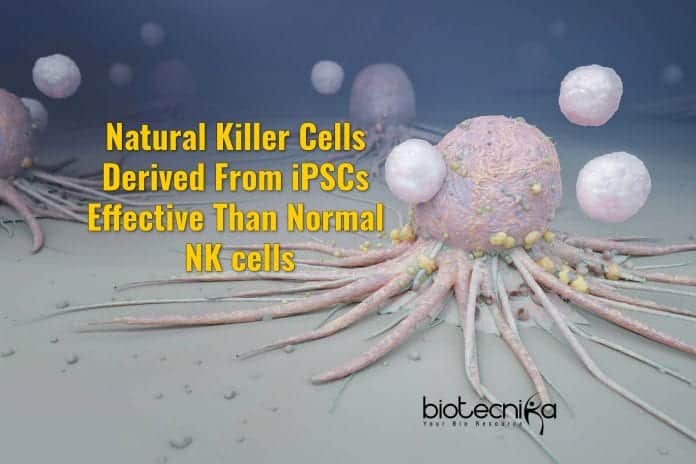Scientists at the University of California, San Diego (UCSD) reports natural killer cells mass-produced from induced pluripotent stem cells (iPSCs) can be more effective killers and more persistent than the natural-born natural killer cells.
By depriving a gene that encodes a crucial cytokine regulator from the human iPSC-derived cells, scientists say they can be turned into uninhibited killing machines.
Cytokine-inducible SH2-containing protein or CISH protein is normally expressed by NK cells stimulated by interleukin-15 (IL-15) or other cytokines. CISH is involved in a checkpoint or braking mechanism, without which the NK cells can go on a killing spree.
The human iPSC-derived NK cells have greater cytotoxic activity in Vitro, as per the experimental evidence. Even the tumor progression could be inhibited using these cells. They are also more effective in inhibiting tumor progression in Vivo. Greater metabolic fitness is displayed by these cells, which help them to keep a killing spree going.
Dan Kaufman, professor of medicine at the UCSD School of Medicine, led the study titled “Metabolic Reprogramming via Deletion of CISH in Human iPSC-Derived NK Cells Promotes In Vivo Persistence and Enhances Anti-tumor Activity.”
Researchers found that mice that harbored human leukemia cells were cured when introduced with
CISH-deleted iPSC-derived NK cells, but those treated with unmodified NK cells died from leukemia. The results suggest that the activation of iPSC-derived NK cells can be improved by removing an inhibitory gene.The function of NK cells is improved in at least two different ways when CISH is deleted. First, the activation and function of NK cells are improved as the CISH deletion removes a brake on IL-15 signaling, even at low IL-15 concentrations. Second, they are metabolically reprogrammed, making them more efficient at energy utilization.
NK cells are part of the innate immune system, the same family as B cells and T cells. They are among the first to respond to foreign invaders, cells, viruses, or early signs of cancer. The NK cells hold great promise in anticancer therapies.
Kaufman and his team first reprogrammed blood or skin cells to turn them into iPSCs, which were then programmed to become NK cells. Then the CISH gene was removed from the iPSC-derived NK cells. CISH deleted NK cells showed better IL-15-mediated JAK-STAT signaling, a mechanism that alerts lymphocytes, macrophages, fibroblasts, and other immune cells to sites of inflammation, trauma, and infection.
These natural killer cells from iPSCs also demonstrated improved metabolic fitness characterized by increased basal glycolysis, glycolytic capacity, maximal mitochondrial respiration, spare respiration capacity, and ATP-linked respiration mediated by mTOR (mammalian target of rapamycin) signaling, involved in improving NK cell function.
The researchers are hoping that they can translate the findings into effective clinical therapy to treat hematologic (blood) malignancies and solid tumors. Moreover, a standardized treatment can be developed for treating hundreds or thousands of patients, and they do not need to be matched to individual patients.
































